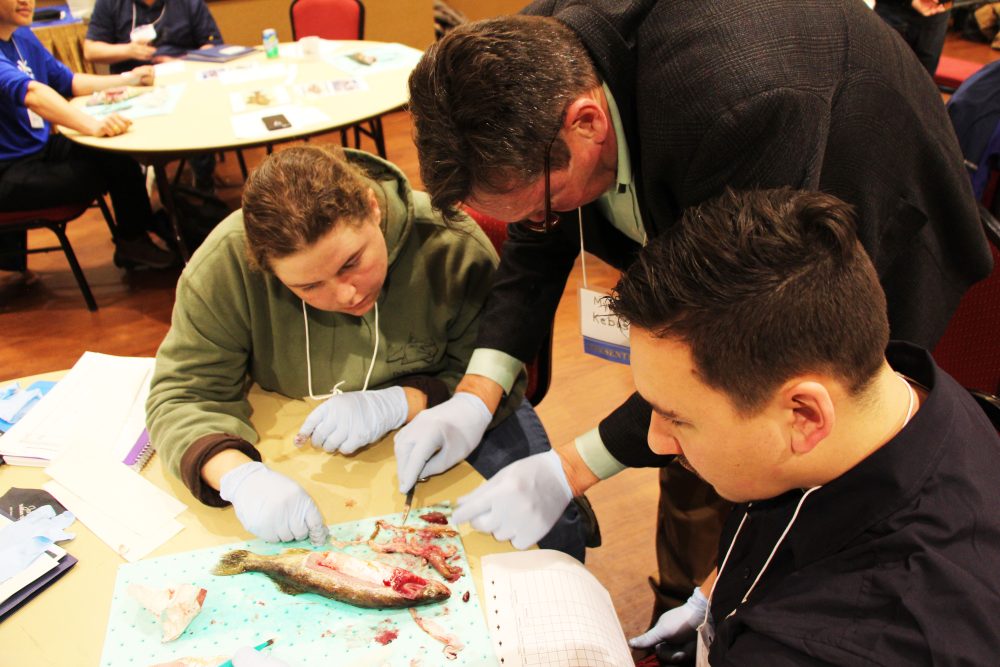Strengthening disease identification, prevention, and mitigation by providing fish farmers with tools to respond to fish health problems
FUNDED BY: THE NORTH CENTRAL REGIONAL AQUACULTURE CENTER
THE BACKGROUND
Aquaculture in the North Central Region is incredibly diverse. The diversity of systems, species, the spread of facilities across this region, in addition to the effects of climate change constitute a challenge for assuring a healthy and sustainable aquaculture industry. Fish diseases are one of the major limiting factors to the aquaculture growth.
In a recent survey conducted during spring 2024, by the National Aquaculture Association, it was found that Aquatic Animal Health was one of the most important topics for priority research. Some of the topics that were highlighted included improving farm management practices, education and training for veterinarians and fish health professionals, development of therapeutants, and risk management evaluation, with the aim of “implement risk-based health assessment and management practices to protect and support the care and growth of farm-raised aquatic animals and to prevent pathogen introduction, spread, or release.” (NAA, 2024).
THE PROJECT
Improving farmed fish health in the North Central Region (NCR) was identified as a priority need during the 2020 NCR Aquaculture Roundtable Sessions. This project will implement a series of workshops focused on providing theoretical and practical knowledge on fish disease detection, diagnosis, control, and biosecurity, including delivery of hands-on technical skills to fish producers, extension educators and fish health regulators, in Indiana, Illinois, Michigan, Missouri, Minnesota, Ohio, and Wisconsin.
In addition, this project includes the evaluation of risk factors associated with morbidity and mortalities on tilapia, yellow perch, and largemouth bass, and will consider other species if time and resources allow it. This project will also evaluate the interest of fish producers for incorporating vaccination practices to improve fish production and productivity. Currently, it has been found that only 11% of producers vaccinate, but producers have expressed strong interest in receiving assistance on vaccinating tilapia, largemouth bass, and other important NCR species.

OBJECTIVES
- Provide practical training to fish producers on fish diseases, and diagnostic practices.
- Identify current fish health practices.
- Introduce minimum standards for fish health record-keeping in the North Central Region.
- Introduce a model for fish farmers to identify, prevent and respond to fish health problems.
- Develop extension materials and information on fish disease identification, prevention, and response practices.
- Identify future needs to improve fish health.
- Evaluate fish farmers’ interest for potential use of fish vaccination to minimize production losses in fish culture.
DELIVERABLES
- Six hands-on training workshops in the North Central Region (Indiana, Illinois, Michigan, Minnesota, Missouri, Ohio, and Wisconsin).
- Fish health record keeping format.
- Fish disease model response plan for fish farmers.
- Survey to evaluate fish farmers’ interest in using vaccines in fish health management.
- Develop extension materials and information on fish disease identification, prevention, and response practices, including a booklet that addresses fish health best management practices.
PARTNERS
- Principal Investigator: Herbert Quintero, Ohio State University
- Co-Investigator: Myron Kebus, Michigan State University
- Co-Investigator: Stuart Carton & Amy Shambach, Purdue University & Illinois-Indiana Sea Grant
- Industry Liaison: Margaret Cleveland Ozark Fisheries
- Extension Liaison: Emma Hauser, University of Wisconsin-Stevens Point Northern Aquaculture Demonstration Facility & Wisconsin Sea Grant
References:
National Aquaculture Association. 2024. Aquaculture Research Priorities – One industry, one voice. https://nationalaquacultureassociation.growthzoneapp.com/ap/CloudFile/Download/pQVg2V3P